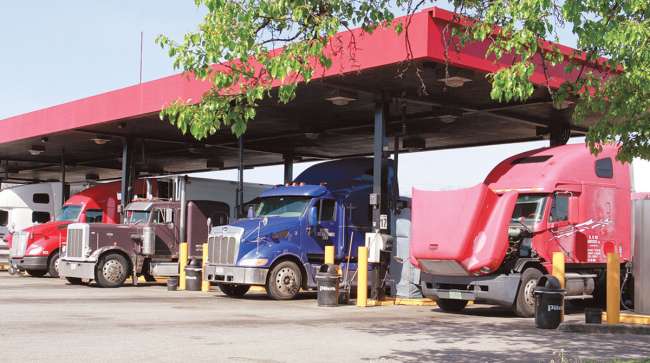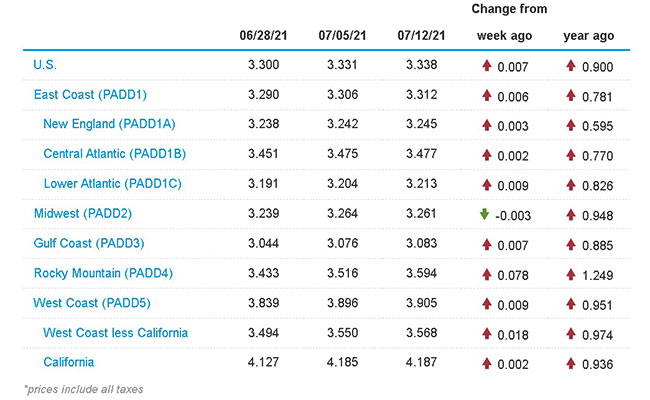Staff Reporter
Average Price of Diesel Nudges Up to $3.338 a Gallon

[Stay on top of transportation news: Get TTNews in your inbox.]
The national average price for a gallon of diesel rose seven-tenths of a cent to $3.338 a gallon, the Energy Information Administration reported July 12.
“As fuel prices rise and fall and rise again, we maintain a disciplined approach around fuel efficiency/technology, containing pump cost through in-network fueling, reducing out-of-route mileage through planned routing and continual coaching to reduce engine idling,” Wes Kornowske, vice president of operations at Paper Transport, told Transport Topics. “As fuel prices change, our discipline does not.”
EIA also reported that the national average price of gasoline increased by 1.1 cents a gallon to $3.133.
Highlights
• Diesel has risen in price for 11 consecutive weeks, totaling 21.4 cents.
• Trucking’s main fuel now costs 90 cents more than it did at this time in 2020.
• Prices rose in nine of the 10 regions in EIA’s weekly survey, with the largest being 7.8 cents in the Rocky Mountain region. Diesel dropped by three-tenths of a cent in the Midwest.
• The last time diesel’s national average price fell was April 19, when it dipped a half-cent to $3.124. There was no change the week of April 26 before starting its 11-week climb with a 1.8-cent increase May 3.
“The typical summer consumption cycle of gasoline has been amplified by the surge in American consumers driving and the sheer amount of trucks on the road,” Total Quality Logistics President Kerry Byrne told TT. “The 37% hike in diesel prices, compared to last year, has proportionately impacted our fuel surcharge fees and is another headwind we are all feeling in the transportation industry. We issue a monthly market update to our customers and have been guiding that this will impact diesel prices through the end of summer, and beyond, with coming carbon emission taxes.”
Total Quality Logistics, headquartered in Cincinnati, ranks No. 9 on the Transport Topics Top 50 list of the largest logistics companies in North America.
OPEC+, the nonmember division of the Organization of the Petroleum Exporting Countries, has been wrestling with an international impasse that threatens prices domestically. The group has been struggling to make a deal with Saudi Arabia and the United Arab Emirates to raise oil output. Russia has been working behind the scenes to bring the countries back to the table.

Flynn
“There’s still upward pressure on these prices,” Phil Flynn, a senior energy analyst at The Price Futures Group, told TT. “What seems to be a real concern is that the market had expected that we would see, because in Russia, OPEC+ raised production, but the stalemate means that isn’t going to happen. And I think the latest thing that we heard from the International Energy Agency [on July 13] is basically warning that if they don’t increase production, we’re going to see supplies tightened significantly in the month of August.”
Flynn added that concern is going to keep fuel prices high. He also noted demand isn’t slowing down at this point and that his expectations are that there will continue to be upward pressure on diesel prices.
U.S. On-Highway Diesel Fuel Prices

EIA.gov
“The other thing you’re competing with is the return of air traffic,” Flynn said. “We just hit a record air travel number, or at least a record since the pandemic began. Before truck drivers were the only game in town during the pandemic. And now they’re back to competing with jet fuel, which is a dynamic that is going to keep upward pressure on the prices.”
Want more news? Listen to today's daily briefing below or go here for more info:

